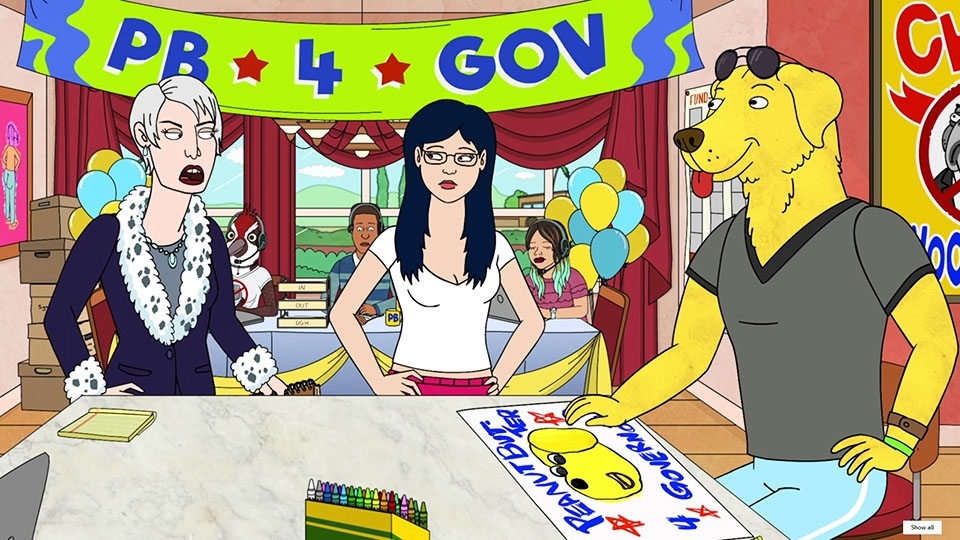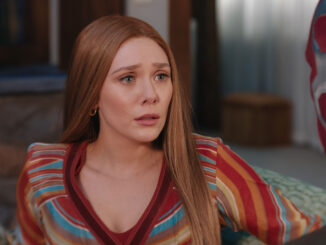

One of the subplots this season is Mr. Peanutbutter’s run for the CA governor’s office.
By Zach Landau | A&E Editor
Coming off the heels of a shocking and emotionally-devastating season finale, BoJack Horseman repositions itself as the premiere animated comedy about a horse who is, to borrow from the show’s lexicon, too much, man. The emotional and comedic depth offered in its last three seasons provided the perfect fodder for even more jokes, more laughs and more gut-punches as the colorful characters of Hollywood face the culmination of all the good and bad decisions that mar their lives and the lives of everyone around them.
It’s this cocktail of chaotic events that forms the basis of the anarchic comedy and toxicity that runs through the show. Characters in BoJack face decisions day in, day out that are as seemingly innocuous as they are fatal. Family and marriage drama, the cyclical nature of abuse, the ineffectualness of democracy and the fickleness of the common man all feature prominently throughout this and other seasons of the show.
Thus, let me just say, without hyperbole, that BoJack Horseman is the reason television was made.
Another medium simply doesn’t exist that can run the gambit of the human condition without slowing down for one second to catch the audience up. Every beat of the show happens so fast that simply trying to care can often feel overwhelming. But, to use a severely trite phrase, that’s the point. To care deeply about other people — be they real or imaginary — isn’t a practice of turning off the brain or simply being present. It involves real investment, a type of attention that isn’t easy and can often be exhausting.
This theme reveals itself most completely in BoJack’s relationship with his (supposedly) long-lost daughter, Hollyhock. Throughout the season, the two grapple with the idea of what it means to be a family, with BoJack despising his abusive parents and Hollyhock coming from an eclectic and sometimes overbearing family of eight dads. Within Hollyhock, BoJack sees all of the potential he never had to live a happy life, yet he continuously, almost obsessively, puts his interests first.
This disparity between who BoJack thinks he is, who he wants to be and who he actually is plays out expertly in the sixth episode, which features his internal running monologue. He constantly berates himself for being a terrible person, struggles with his inability to handle his alcoholism and yet still does the right thing in the end. What should be a triumphant moment for the character, however, is undercut within the last seconds of the episode when he lies to Hollyhock about the nature of their hereditary depression, setting her up to repeat his self-flagellation later in her life.
The genealogy of hate repeats itself often in this season, more so than the last three. One major subplot, for example, finally fills in the blanks surrounding BoJack’s abusive parents offering a clearer insight into the type of environments that can produce such ruthlessly-despicable caretakers. Beatrice, BoJack’s mother, suffocated under the pressures of middle-class womanhood, repressing her empathy and “womanly emotions” to the point that it is any wonder why she isn’t even crueler than she is.
While Beatrice is offered tons of sympathy, the show carefully makes sure the audience does not side with her too much. Her traumatizing — and often horrifying — past never feels like an excuse for the way she treated BoJack, but the episode done from her point of view encapsulates the dangers of her upbringing so perfectly that I couldn’t believe that two episodes ago I thought I saw the best show ever.
That was actually the second time I caught myself lauding the show too early. While not every episode is some landmark achievement of television, this season especially pushes what can be done with an animated comedy. There are tons of visual jokes that simply don’t work as well with real actors, and certain episodes play with effects and time lapses that just wouldn’t look right in live action.
The second episode, “The Old Sugarman Place,” is a perfect example of what I mean: Throughout the episode, the phantoms of Beatrice’s childhood mix seamlessly within the space that BoJack occupies, creating little pockets of the past that mirror her trauma with the small victories of the present. This contrast would have been too difficult to pull off in live action (though it would be admittedly cool to see someone try it) but works perfectly in an animated setting.
If I did have to point out a major fault with Season 4 of BoJack, it would be the decreased reliance on BoJack’s phone to prove a point. In the past, the phone was an excellent stand-in for the Hollywoo lifestyle and acted like a tether to keep BoJack tied to the world around him. It often interrupts crucial moments in BoJack’s life, such as cutting off his motivational tapes so he can be berated by his mother or pulling him out of a drug-induced bender that left him stranded in a parking lot, and its presence as a noteworthy narrative tool was severely missed for me. It features heavily in the second episode but hardly makes much of an appearance after that.
To be expected, however, the show more than makes up for the phone’s absence. With much of the vapid-celebrity-lifestyle ground covered in the last three seasons, BoJack moves forward with much more intimate and personal stories to cover. Most major characters get their own episode devoted entirely to them, which, while effective in tackling the numerous themes and issues of the show, also points out another possible flaw: it may be spinning too many plates.
There is something like seven separate character arcs interwoven in BoJack, and while the show does manage to tell them as best as one can hope, some feel like they needed more space to be fleshed out. Diane especially gets the short end of the stick here, as her character is tacked on to Mr. Peanutbutter’s and BoJack’s stories. By the end of the season, it is not entirely clear what type of growth she achieved, and the last moments with her are somewhat shocking as they feel antithetical to the rest of the season — even if they do feel appropriate in the context of her character as a whole.
See, that’s kind of the problem calling it a flaw. The characters are not bad and their narratives are expertly told. Rather, the show is so well done that it really can’t cram so much good content into only 15 episodes. Someone is bound to lose out, especially if one or more characters receive a stronger focus. What a problem to have, though: being too good for it’s own sake.
But what else is there to say? I cannot heartedly recommend BoJack Horseman enough. This season cemented in my mind why I loved the show in the first place, and it has legitimately made me excited for the generation of artists that are equally impressed by this masterclass of comedy and tragedy. At this point, if you are not watching it, then you are doing yourself a disservice, so please, do whatever it takes to watch BoJack Horseman.




